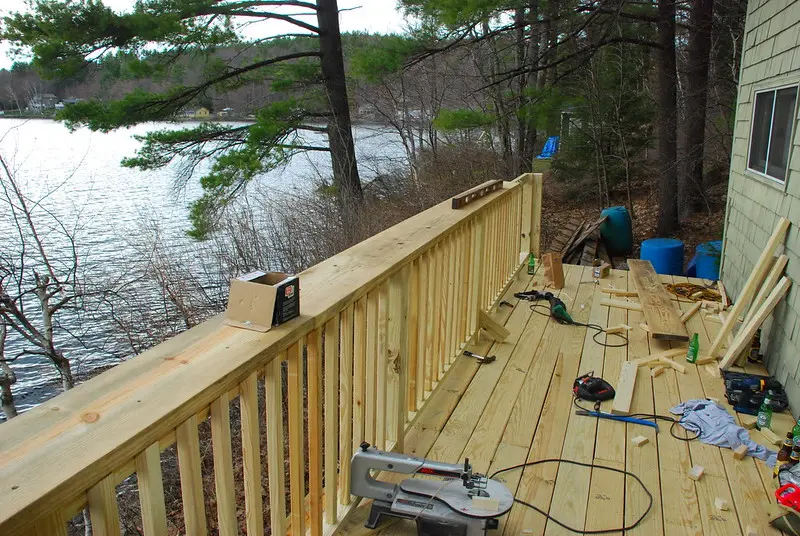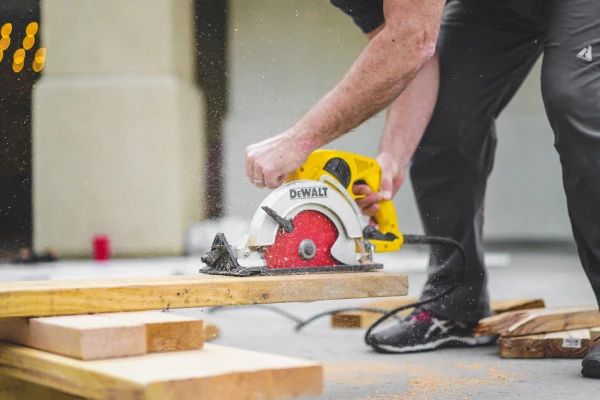How much does it cost to build a deck?

A deck is an excellent addition to any home. It not only provides a comfortable space for outdoor living, but it also increases the property value. Building a deck involves various factors that influence its overall cost. From material to labor, design and additional features contribute to the final price of a deck.
Material Cost
The material is one of the most significant factors influencing the cost of a deck. The three most common materials used for decks are:
1. Wood
- Types: Pressure-treated lumber, Cedar, Redwood, Tropical hardwoods.
- Costs:
- Pressure-treated lumber: $10-$20 per square foot.
- Cedar: $20-$30 per square foot.
- Redwood: $25-$35 per square foot.
- Tropical hardwoods: $30-$50 per square foot.
- Benefits: Natural look, can be stained or painted.
- Drawbacks: Requires regular maintenance and can be affected by weather and insects.
2. Composite
- Types: Trex, TimberTech, Fiberon.
- Costs:
- $20-$45 per square foot.
- Benefits: Low maintenance, resistant to weather and insects, available in various colors.
- Drawbacks: More expensive than wood, can get hot in direct sunlight.
3. PVC
- Types: AZEK, VEKAdeck.
- Costs:
- $25-$40 per square foot.
- Benefits: Lightweight, resistant to weather and insects, low maintenance.
- Drawbacks: Looks less natural than wood and can be more expensive.
Size and Design
The size and design of the deck also play a significant role in its cost. An enormous deck will cost more due to the increased material and labor required. A more intricate design with features like railings, stairs, and built-in seating will also increase the cost.
Labor Costs
Labor costs can vary significantly based on location, time of year, and the complexity of the deck design. The labor cost can vary, typically between $10 and $30 for every square foot. Getting multiple quotes from different contractors is advisable to get the best deal.
Additional Costs
- Permits: The necessity for a permit to construct a deck is contingent on your geographical area. Permit expenses fluctuate, potentially costing anywhere from $50 to over $500.
- Preparation of the site: The site may need to be cleared and leveled, or a foundation may need to be laid. The price can range between $1 and $5 for every square foot.
- Accessories: Adding accessories like lighting, benches, planters, etc., can increase the cost by $10 to $50 per square foot.
Cost Saving Tips
- Do-It-Yourself vs. Engaging a Specialist: If you possess the requisite expertise and available time, you can independently reduce labor expenditures by constructing the deck. However, remember that it is labor-intensive, and you may need to rent or buy tools.
- Choosing cost-effective materials: Opting for pressure-treated lumber instead of redwood or tropical hardwoods can save you money.
- Opting for a simple design: A simple rectangular deck with no railings or stairs will be much cheaper than a deck with intricate designs and additional features.
How to Calculate Deck Building Cost
To calculate the cost of building a deck, consider various factors and their associated costs. Here is a step-by-step formula to calculate the price:
1. Determine the Area:
- Area of the deck = Length x Width
- Example: If your deck is 20 feet long and 15 feet wide, the area will be 20 x 15 = 300 square feet.
2. Calculate Material Cost:
- Material Cost = Area of the deck x Cost of material per square foot
- Example: If the area of your deck is 300 square feet and you are using pressure-treated lumber that costs $15 per square foot, the material cost will be 300 x 15 = $4,500.
3. Calculate Labor Cost:
- Labor Cost = Area of the deck x Labor cost per square foot
- Example: If the labor cost is $20 per square foot, the labor cost for a 300 square foot deck will be 300 x 20 = $6,000.
4. Calculate Additional Costs:
- Additional Costs = Permit Cost + Site Preparation Cost + Accessories Cost
- Example: If the permit cost is $200, the site preparation cost is $300, and the accessories cost is $500, the total additional charge will be 200 + 300 + 500 = $1,000.
5. Calculate Total Cost:
- Total Cost = Material Cost + Labor Cost + Additional Costs
- Example: If the material cost is $4,500, labor cost is $6,000, and additional charges are $1,000, the total cost will be 4,500 + 6,000 + 1,000 = $11,500.
So, the total cost to build a 300 square foot deck using pressure-treated lumber, with a labor cost of $20 per square foot and additional costs of $1,000, would be $11,500.
FAQ (Frequently Asked Questions)
1. Which material is the most economical choice for constructing a deck?
Pressure-treated lumber is usually the most cost-effective material for building a deck. It is widely available, durable, and relatively inexpensive compared to other decking materials.
2. Is it cheaper to build a deck yourself or hire a professional?
It can be cheaper to build a deck yourself if you have the necessary skills, tools, and time. However, hiring a professional ensures that the deck is built correctly, safely, and up to code, which can save you money in the long run by avoiding costly mistakes and repairs.
3. How much does it cost to build a deck per square foot?
The expense associated with constructing a deck can vary widely, from $15 to over $100 per square foot, influenced by the cost of materials, design complexity, and labor charges in your region.
4. Do I need a permit to build a deck?
Permit requirements vary by location, so checking with your local building department or municipality before starting your deck project is essential. Generally, a permit is required if the deck is attached to the house, is higher than a certain height, or is of a specific size.
5. How long does it take to build a deck?
The time it takes to build a deck depends on its size, complexity, and the number of people working on it. A simple, small deck can be made on a weekend by a couple of people, while a large, complex deck can take several weeks to complete with a professional crew.
6. How much does it cost to install deck railings?
The expense of installing deck railings can vary from $10 to $50 for each linear foot, influenced by the type of material and the design of the railings.
7. Is it possible to construct a deck on an irregular surface?
Yes, you can build a deck on uneven ground, but it will require additional site preparation and foundation work, which can increase the project's cost. It is essential to level the ground as much as possible and use concrete footings or piers to support the deck.
8. How often does a deck need maintenance?
The maintenance required for a deck depends on the material used. Wood decks must be cleaned and sealed or stained every 1-2 years, while composite and PVC decks require less maintenance, usually just regular cleaning.
9. Can I add a fire pit or hot tub to my deck?
Yes, you can add features like a fire pit or hot tub to your deck, but it will require additional structural support and may need a permit. It's crucial to seek advice from a qualified professional to guarantee the deck can bear the extra load and comply with all safety and construction regulations.
10. Is it cheaper to build a deck in the fall or spring?
The expense associated with constructing a deck can fluctuate depending on the season. Depending on the region, some contractors may offer lower prices during their off-season, which can be in the fall or winter. Obtaining various estimates from multiple contractors is crucial for securing the most favorable arrangement.
Questions to Ask When Evaluating Deck Building Companies
1. How many years of experience do you have in deck building?
This question will help you assess the company's expertise and whether they have the necessary experience to handle your project.
2. Can you provide references or a portfolio of past deck projects?
Ask for references or a portfolio of past deck projects to evaluate the quality of their work and customer satisfaction.
3. Are you licensed and insured?
Ensure that the deck construction company holds the necessary licenses and insurance to safeguard against any potential liabilities during the building process.
4. What type of warranty do you offer?
Ask about the warranty on materials and craft to understand what is covered and how long.
5. Do you handle permits and inspections?
Some deck building companies will handle your permits and inspections, while others may require you to do it yourself. Make sure to clarify this before starting the project.
6. What is the estimated timeline for the project?
Request a projected schedule for the project to gain an understanding of the duration required to finish the deck.
7. What is the payment schedule?
Understand the payment schedule, including the deposit, progress, and the final payment.
8. Do you offer any additional services, like site preparation or installation of accessories?
Some deck building companies may offer additional services like site preparation, installation of accessories, etc. Make sure to ask about this and whether any additional costs are associated.
9. Can you provide a detailed written estimate?
Request a comprehensive written quotation that encompasses all expenses related to the project.
10. What is your policy for changes or additions to the project once it has started?
Understand the company's policy for changes or additions to the project once it has started, including any associated costs.
11. How do you handle adverse weather conditions during construction?
Inquire about the company's approach to managing unfavorable weather conditions during construction to ensure the project progresses as planned.
12. What measures will you implement to safeguard my property throughout the construction process?
Ask about the company's steps to protect your property during construction, including your lawn, plants, and any other structures.
A deck is a great way to enhance your outdoor living space and increase your property value. However, it can be a costly project. It is essential to consider all the factors contributing to the cost, such as materials, size, design, labor, and additional features. Doing so lets you make an informed decision and get the best value for your money. If you're interested in refreshing the look of your existing deck you may want to check our deck painting cost guide.
The opinions articulated in this piece are the guest author's and may not necessarily align with those of Crackerjack. Find more about staff authors of Crackerjack

